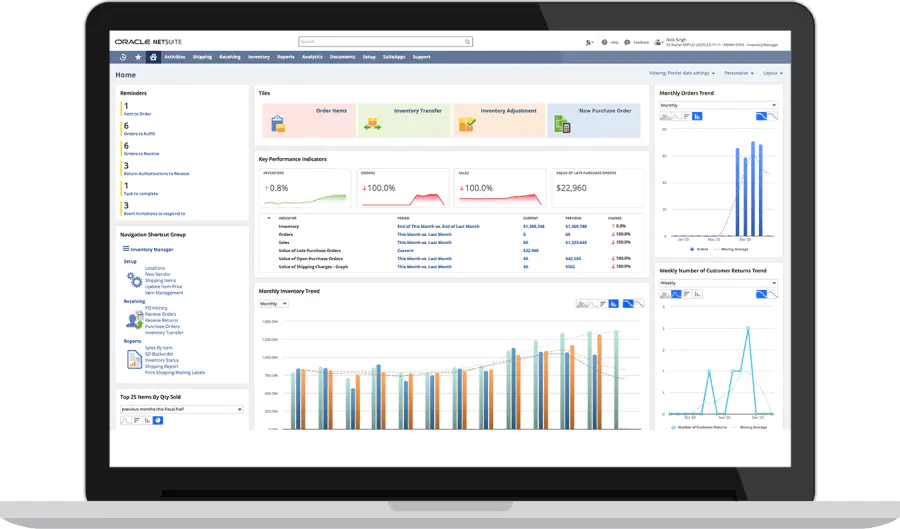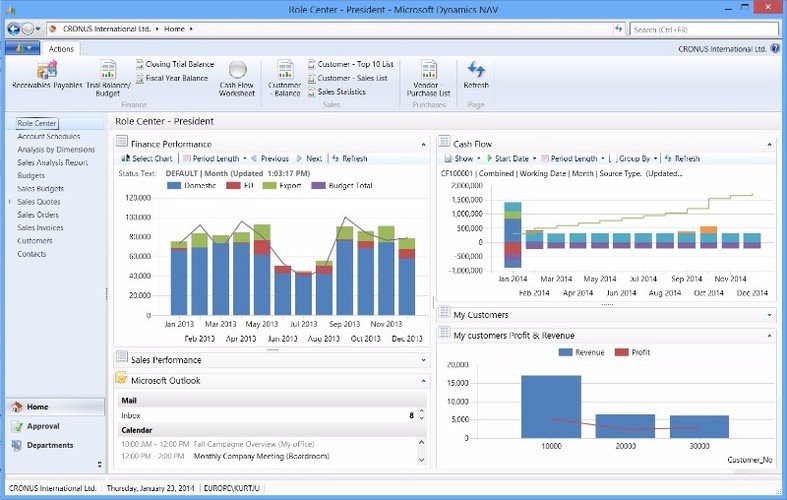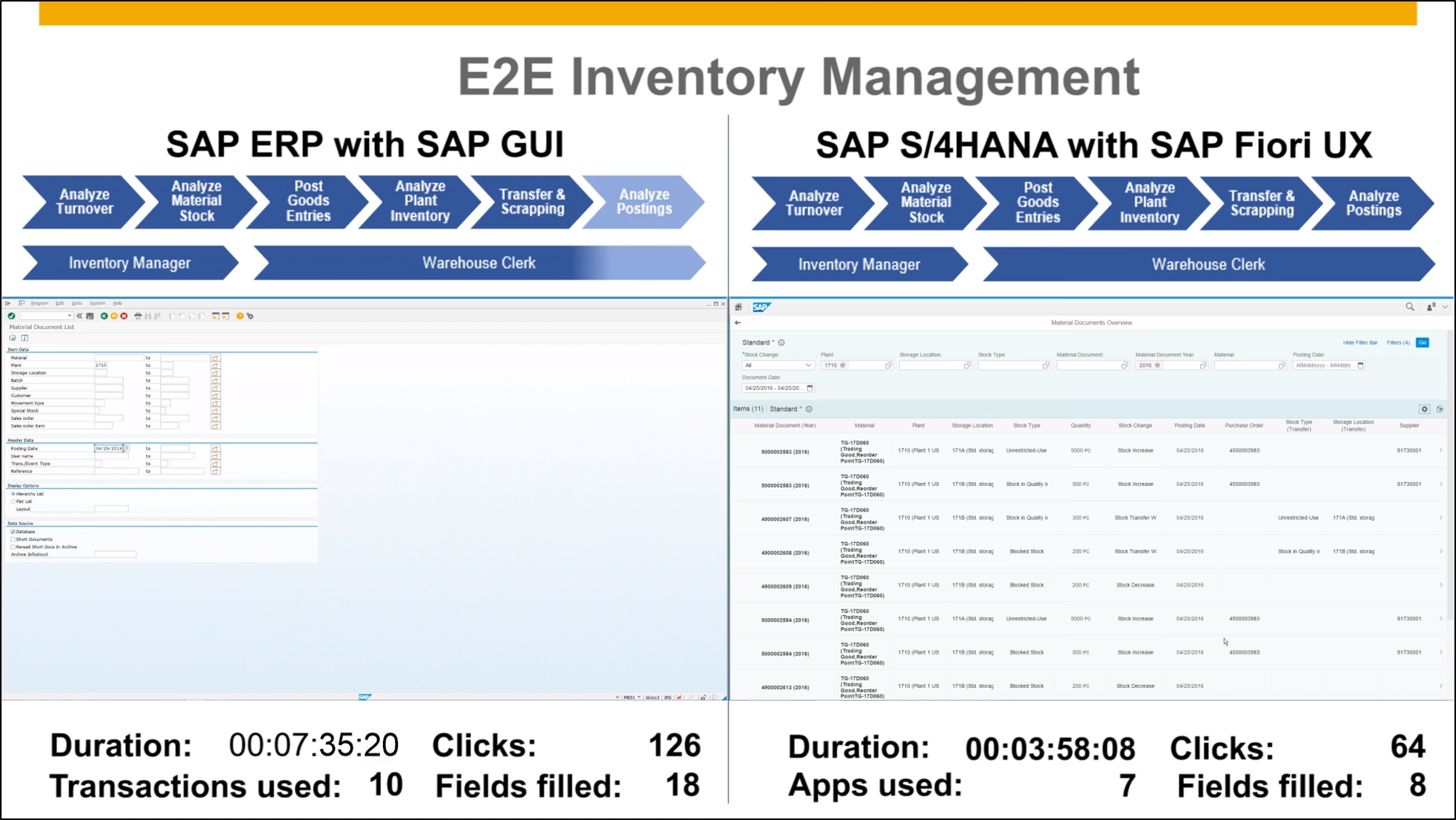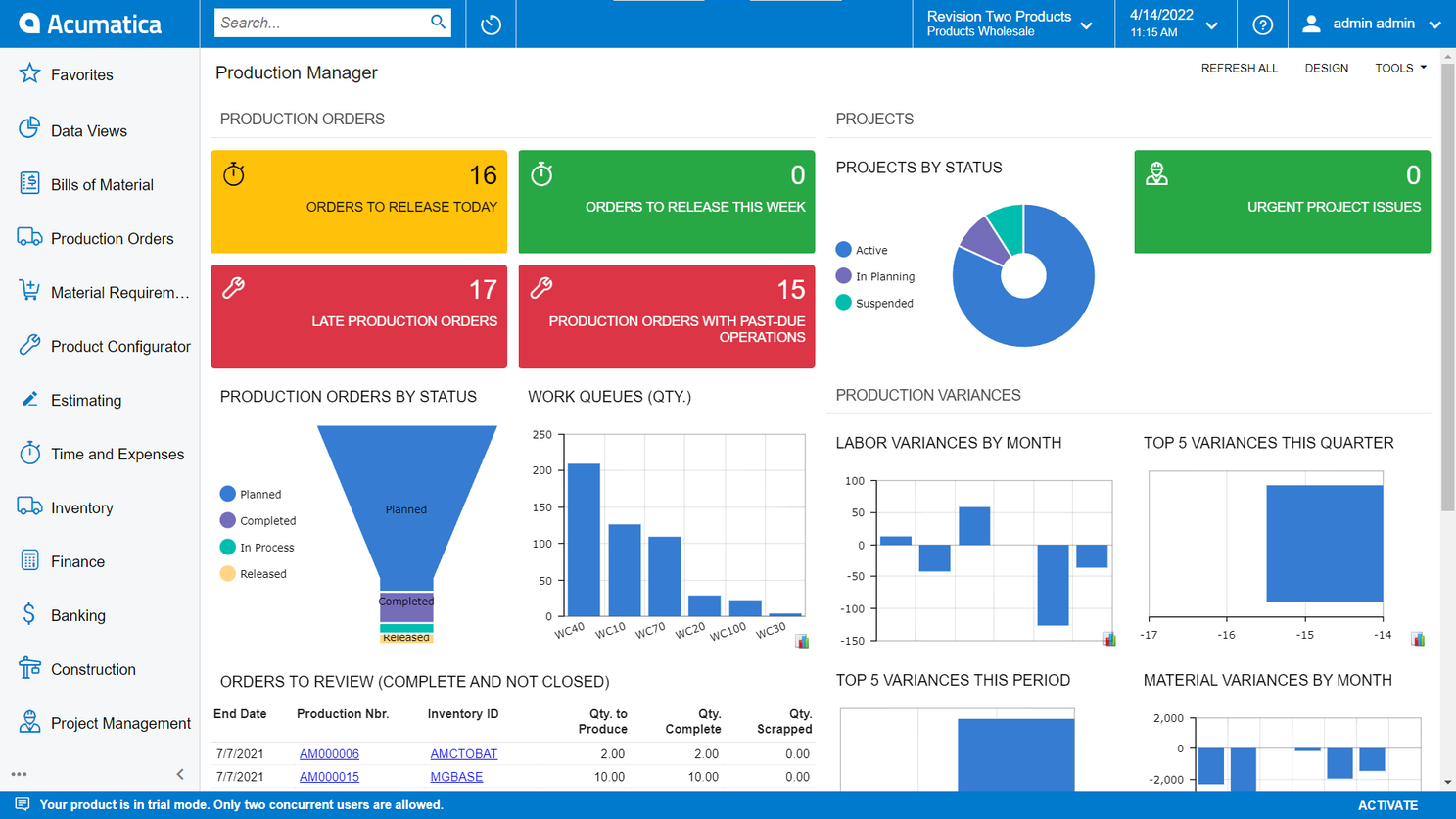Enterprise Resource Planning (ERP) tools help streamline many managerial functions like manufacturing, inventory management, payroll, HR, and reporting, into a single database. This enables major companies to streamline company data and control data flow between branches.
This results in cutting down data inconsistencies between branches and enables you to get the correct workflow analytical data to make more suitable managerial choices.
With the ERP market projected to manage $117.09 billion by 2030, the importance and influence of ERP software are very much clear.
What is Enterprise Resource Planning (ERP) Software?
Enterprise resource planning software gets daily inputs from multiple units, uniting them into a central source of truth that contributes to the overall business. ERP tools integrate comprehensive data and essential parameters picked up by a host of sectors, including marketing, HR, finance, operations, manufacturing, and sales. ERP systems integrate data, reduce handbook entries, and can make business data noticeable to the essential parties involved and their units.
For instance, a project management module, when combined with ERP software, enables project managers to follow strategies and timetables. As projects advance, the ERP system registers inbound data, organizing it for the relevant personnel to access, who then might create staffing, organizing, and financial projections to respond immediately to fluctuating conditions. Management can get an accurate picture of the development going on in their different projects. Hence, funding and projections are more tangible because they are based on authentic, real-time data.
Criteria for Enterprise Resource Planning System Comparison
What are we looking for when we pick enterprise resource planning software for evaluation? Here’s a summary of the criteria for the evaluation:
- User Interface (UI): Is it neat and appealing?
- Usability: Is it simple to understand and grasp? Does the firm provide reliable guidance, tech support, user support, and instructions?
- Streamlined Features: Are there any integral features to collaborate with in accounting, stock & depository supervision, and marketing?
- Reporting and Analytics: Does it provide adaptable, powerful reporting, and analytics benefits for tracking business execution? Are records painless to send, structure, and disseminate?
- Integrations: Is it simple to couple with other tools? Any pre-designed integrations?
- Value for money: How fair is the cost for the attributes, facilities, and use case? Is pricing transparent and adjustable?
- On-Premise vs Cloud ERP: These are the two standard deployment choices. Is the ERP software cloud-based or handed over as a SaaS? Would you like to work with software vendors to go through the ERP execution and install it on-site?
- Real-time updates: Does the system release real-time updates on things like inventory management, recent buying orders, or invoice payments? Running your software accurately for up to a minute will increase efficiency and diminish misunderstandings.
When examining ERP software for the benchmarks above, it is crucial to look at the industry-specific requirements of your organization.
For instance:
- Manufacturing firms must monitor manufacturing procedures and their supply chains.
- Distributors will have to monitor purchase orders together with ensuring adequate order management, order processing, and depository management.
- Big companies might require everything from sales to marketing to manufacturing to distribution. Regardless, companies of all sizes call for a certain ERP software system that suits their industry requirements.
Key Features of Enterprise Resource Planning Tool
Top 4 ERP Platforms
Let’s take a look at the four most suitable ERP software that will encourage you to take care of your managerial functions better and enhance them to improve your business outcome. You will get all the knowledge you require, choosing the best one for your big company’s scalability demands.
NetSuite ERP is a highly successful omnichannel ERP system keen to cash in on the exploding e-commerce business. With a solid ranking on major lists, categories, and several industry honors, NetSuite puts forward solutions for firms of all industries and environments, skilled at dealing with the details essential to delivering resource management at its best.
To uphold such a position, NetSuite ERP simplifies mission-critical operations, leaving plenty of room for renovation and change to the particular needs of your organization. It provides state-of-the-art budgetary, resource handling, and supply chain management to have you prepared for looming market possibilities. Simultaneously, you will use ingenious technology that embraces trends flawlessly, making sure that you’re continually one step further from your opponents.
NetSuite ERP comprises many in-suite modules you’d get for a single established fee and they are:
- Financials
- Production Management
- Order Management
- Warehouse & Fulfillment
- Supply Chain Management
- Procurement
- Unique Human Capital Management
NetSuite ERP has also joined hands with several leading industry solutions to simplify data migration.
Features of NetSuite ERP
- Accurate financial forecasting
- The reputation of a financial management leader
- End-to-end visibility of your supply chain
- Efficient Transaction Processing
- Employee management
Microsoft Dynamics is a Customer Relationship Management (CRM) and ERP software system that is apt for branches like finance, marketing, manufacturing, and so on. Right now, it is accepted by over 200,000 shareholders internationally.
It is most suitable for those that would like to hand over the finest operational experience to their consumers.
If your firm engages in finance, marketing, and manufacturing activities, Microsoft Dynamics would be our advisable software. One reason we recommend this software is because it allows firms an overall picture of their financial condition.
Key Features:
- Aims at different industries, comprising marketing, service, finance, manufacturing, and the public sector.
- Accompanies an in-built analytics unit that develops actionable insights and powerful records.
- Broadly integrated with many applications, like SharePoint, Word, Outlook, Lync, and so on.
- ERP software can supply layout and remote help.
- With its Dynamics 365 and Adobe Marketing Cloud, it sets up a closed-loop marketing system that empowers you to interpret the outcomes of your marketing campaigns.
- Supplies an extremely collaborative atmosphere.
- Comprehensive customer support alternatives, particularly phone and live chats
- Extremely flexible and scalable ERP software.
- Provides server-to-server authentication to increase data security.
- In tune with many platforms, particularly iOS and Android
For ERP solutions, SAP leads the market. SAP solutions are increasingly being used as ERPs, and it revels in a sizeable chunk of the portion of the market. Large-sized companies can use the SAP S/4HANA business suite. SAP S/4HANA has strong real-time data analysis facilities and can deploy on-site, hybrid, or cloud.
Most suitable for medium to large size organizations.
It comprises a database management system called HANA (High–Performance Analytics Appliance) which is extensively used for sophisticated analytics and data processing.
Features:
- SAP S/4HANA has intrinsic intelligent technologies like Advanced Analytics, Machine Learning, and AI.
- It has a streamlined data model and an in-memory database.
- It has techniques and the best expertise for a vast array of industries.
Acumatica is small, but it’s expanding fast — and they provide unparalleled services for unique types of organizations.
They provide sector-wide ERP solutions. So, regardless of what kind of company you have, you see that you’re not having cookie-cutter software.
Major ERP Software for SMEs.
A brief list of the ERP software editions:
- General Business Edition
- Manufacturing Edition
- Distribution Edition
- Construction Edition
- Field Service Edition
- Commerce Edition
As long as you have a small to medium-sized business in one of the above sections, Acumatica will be the first for you to look at.
Acumatica ERP is immensely adaptable. Irrespective of what sort of challenges your organization has, you can have a complete solution from this service vendor.
This top-notch cloud-based ERP software encourages expansion as well. You can quickly append services and facilities as your business mounts. Acumatica also allows you to include additional users without paying for extra licenses.
If you’re curious about knowing a bit more, you can ask for a custom trial and free demo with no strings attached.
Features
- Workflow Automation
- Extendable and suitable for different industries
- Comprehensive inventory control
- Intuitive Analytics
- Cloud-hosted
ERP software can streamline the effectiveness of your operations by presenting multipurpose resources for all of your enterprise activities. This is considerably more beneficial and productive than running different tools from different dealers that don’t blend easily or require employees to log in to various accounts just so they can carry out basic assignments.
Oracle Netsuite, Microsoft Dynamics 365, SAP S/4HANA, and Acumatica are some of the finest ERP solutions on the market currently. SAP Business One, Sage 300, and Syspro are also exceptional tools according to your requirements.







